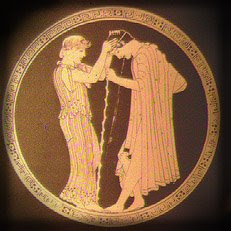

 字體:小 中 大
字體:小 中 大 |
|
|
|
| 2009/01/23 10:49:37瀏覽712|回應0|推薦3 | |
波希戰爭其間,在阿提密喜安戰役的第一天,波斯人從背棄希臘的阿卡地亞人那裡得知希臘人正在雅典舉行奧林匹克運動會(是一種體育與二輪戰車競賽)。波斯人進一步問道:「競賽中的勝利者會獲得什麼獎賞?」阿卡地亞人回答:「勝利者將會戴上由橄欖葉所製成的頭環。」波斯將軍特里坦特莫斯聽到這個,不禁說道:「天阿!我們面對的是什麼樣的敵人阿!他們不為金錢,而是為榮譽而戰!」 根據張大春的認識幾個字,中國人講「贏」這個字,它最早的用法有「超過」的意思,因以它有「不必要」的特質,最多是錦上添花的含意。所以,我們不應該將「贏」當作競爭中終極的報酬。競爭的本質含有自我進步的意義,譬如說,榮譽是一個促進自我進步的動力之一,難怪希臘人將桂冠當作是一種榮譽的象徵,而不在乎它實際的金錢價值。在這個層次之下,似乎中國人和希臘人有那麼一點點相同的地方。 During the Greek and Persian Wars (499~386BC), on the first day after the battle at Thermopylae and Artemisium, from the Greek deserters from Arcadia, the Persians learnt that the Greeks were “holding the Olympic games, seeing the athletic sports and the chariot races.” The Persians further enquired: “what is the prize for which they contend?” “An olive wreath” returned the others, “which is given to the man who wins.” On hearing this, Tritantaechmes, the son of Artabanus, uttered a speech which was in truth most noble, but which caused him to be taxed with cowardice by King Xerxes. Hearing the men say that the prize was not money but a wreath of olive, he could not forbear from exclaiming before them all, “Good heavens, Mardonius, what manner of men are these against whom you have brought us to fight - men who contend with one another, not for money, but for honor!”** The Chinese idea of winning is marked as 贏(pronounced as "yíng"). Its initial usage has certain connotation of "excess", which relates to something unnecessary but an addition to glory. Hence, winning should not be interpreted as the ultimate reward of any competition. The nature of competition consists of self-improvement, such as honor, no wonder the Greeks did not care much about the physical value of the reward. In this sense, the Chinese and the Greek idea of competition seems to have something in common. **Herodotus, The Persian Wars, VIII, 26 |
|
| ( 創作|散文 ) |










